![]()
This study was first published by the Meir Amit Intelligence and Terrorism Information Center.
Overview

European diplomats at the Eighth Bil’in International Conference for Popular Resistance: third from right is the British consul-general in Jerusalem, Sir Vincent Fean, and at the extreme left, John Gatt-Rutter, the EU representative in the Palestinian Authority, both identified by the ITIC (Picture from Wafa News Agency, October 2, 2013)
Foreigners take part in popular resistance events and activities in Judea and Samaria alongside Palestinians. In most cases they are activists, representatives of pro-Palestinian Western NGOs participating in the campaign to delegitimize Israel. In certain instances diplomats and parliamentarians, mainly from European countries, have participated in popular resistance conferences held in Bil’in.[1] In isolated cases, they also participate in activities on the ground which defy Israel. On one occasion a French diplomat was documented attacking an Israeli member of the Border Police during an attempt made by Palestinian activists to erect an illegal outpost in the northern Jordan Valley.
The popular resistance is a strategy supported by the PA and Fatah. It includes violent activities such as the destruction of fences, confrontations with IDF soldiers, throwing stones and Molotov cocktails and in certain instances, carrying out vehicular and stabbing attacks.[2] The Eighth Bil’in International Conference for Popular Resistance, which was recently held and discussed ways and means to encourage the popular resistance, was attended by John Gatt-Rutter, the EU’s representative in the Palestinian Authority (PA) and Sir Vincent Fean, the British consul-general in Jerusalem. Previous Bil’in conferences were also attended by Luisa Morgantini, a member of the European Parliament and a Nobel Peace laureate, who is hostile to Israel.
The PA and Fatah encourage European diplomats and anti-Israeli activists to participate in popular resistance events. They regard their involvement as a tool for enhancing the legitimacy of the popular resistance, as a way of making it difficult for the Israeli security forces to respond to illegal activities and a means of exerting international diplomatic pressure on Israel, especially pressure from European countries. In our assessment, their participation is limited and does not reflect the general conduct of European diplomats in Israel or the PA. However, in those cases in which they do participate in popular resistance events, whether at the Bil’in conferences or activities on the ground, such involvement is exceptional behavior with regard to accepted diplomatic practice. Such involvement may create difficult situations for the IDF (such as the event in the northern Jordan Valley) and reflect badly on Israel in the international arena, especially in European countries.
Participation of Foreigners, Including Diplomats, in the Bil’in International Conferences for Popular Resistance
Every year an international conference for the popular resistance is held in the village of Bil’in (west of Ramallah). The conference is a manifestation of the efforts of the PA, Fatah and popular resistance activists on the ground to put the issue on the national Palestinian and international agendas. The conferences (held in Bil’in but also in other locations in Judea and Samaria) are attended by representatives of the PA, Fatah and other organizations, and field activists promoting the popular resistance. In addition, they are also attended by foreigners, including diplomats (primarily from European countries and the EU) and representatives of pro-Palestinian NGOs participating in the international campaign to delegitimize Israel. The Bil’in conferences discuss ways of expanding the popular resistance, making it more effective, gaining broader support for the Palestinians and extending it to the international arena.
The previous Bil’in conferences were attended by diplomats and foreign parliamentarians. For example, the fifth conference (held April 21-23, 2010) was attended by members of parliaments who gave speeches, and communiqués were read from Desmond Tutu and Jimmy Carter. Among the participants, prominent were Robert Serry, the UN special coordinator for the Middle East, and Luisa Morgantini, a member of the European Parliament. She also attended the seventh conference (held April 10-13, 2012), which passed resolutions calling for strengthening the popular resistance and increasing coordination between Palestinian institutions and legal bodies in the United States and Europe.

Left: Foreign activists wave flags, including the blue EU flag, at an event held during the seventh Bil’in conference (Arabs48 website, April 11, 2012). Right: Luisa Morgantini speaks at a meeting of the seventh Bil’in conference held in the east Jerusalem neighborhood of Silwan (Silwanic.net website, April 12, 2012).
Luisa Morgantini, who has participated in Bil’in conferences, is a representative to the European Parliament from Italy. In the past she was its vice-president, and she is a Nobel Peace Prize laureate. She is a member of the EU delegation to the Palestinian territories and frequently visits Judea and Samaria. Her views are consistently anti-Israel. During the 1970s she expressed solidarity with the PLO. She organizes meetings in the European parliament attended by groups critical of Israeli policy and which present Israel in a negative light.
The Eighth Bil’in International Conference for Popular Resistance, which was held between October 2 and 4, 2013, was attended by two European diplomats:
- John Gatt-Rutter, the EU representative in the PA, whose office is located on French Hill in East Jerusalem. Rutter is originally from Malta, and began his diplomatic career as Malta’s representative to the EU. In 2011 he was deputy EU representative in the PA, and in December 2011 Catherine Ashton, the EU’s foreign minister, promoted him to the post of EU Representative to the West Bank and Gaza Strip, United Nations Relief and Works Agency (UNRWA). He is charged with promoting and funding EU projects in Judea, Samaria and the Gaza Strip, including projects in Palestinian Area C. He often meets with PA officials and representatives of Palestinian organizations. He condemns Israeli construction in Judea and Samaria, which, he claims, does not serve the interests of regional peace. He supports European boycotts of products manufactured in the Israeli settlements and marking their place of origin.

Left: John Gatt-Rutter, EU representative in the PA, at a press conference held jointly with Palestinian foreign minister Riyadh al-Maliki (Al-Watan TV, April 23, 2013). Right: John Gatt-Rutter, front row second from left, at the eighth Bil’in conference for popular resistance. To his right is Rami Hamdallah, Palestinian prime minister (Paltoday TV, October 3, 2013).
- Sir Vincent Fean, the British consul-general in Jerusalem (the consulate has an office in Gaza City as well), is in contact with Palestinians in Judea and Samaria. His office is located in the Sheikh Jarrah neighborhood in east Jerusalem. He joined the Foreign and Commonwealth Office in 1975 and previously served in Tripoli as HM Ambassador to Libya between 2006 and 2010. Before that he was British High Commissioner to Malta from 2002 to 2006. On March 5, 2013, he was attacked by angry Palestinian students at Beir Zeit University (near Ramallah) when he came to speak about British policy in the Middle East and the peace process, forcing him to leave. In June 2013 he paid a visit to the village of Nabi Saleh, a popular resistance focal point, in a show of solidarity. (See below) At the beginning of October 2013, he participated in the Eighth Bil’in International Conference for Popular Resistance.

Left: Fean pushed into his car after having been attacked by outraged Palestinian students in Beir Zeit University (Facebook). Right: Sir Vincent Fean, the British consul-general in Jerusalem (Website of the British Consulate, Jerusalem).
Participation of Foreign Diplomats in Popular Resistance Activities
Overview
In several instances, foreign diplomats, especially from European countries, have participated in various popular resistance events. They have included participation in conferences and events on the ground, some of which have involved violence. In our assessment, their participation was mainly the result of the initiative of the PA, Fatah and popular resistance activists. They wanted to enhance the popular resistance’s international legitimacy and provide those participating in illegal activities with a kind of defense against the Israeli security forces.
Active Participation of French Diplomat in a Popular Resistance Event in the Jordan Valley
On September 20, 2013, dozens of Palestinian demonstrators gathered near the Jewish village of Hemdat in the northern Jordan Valley, accompanied by leftist activists and diplomats. They had brought tents with them and tried to erect an illegal outpost, a tactic adopted by popular resistance activists.[3] The Palestinians threw stones at the Israeli security forces who came to disperse them (Tazpit News Agency, September 20, 2013). As the demonstrators were being evacuated a Reuters correspondent documented the confrontation between a French diplomat and an Israeli security force. During the confrontation the diplomat attacked a policeman from the Israel Border Police force (See picture). According to the Israeli media, a formal complaint was lodged, the result of which was that the diplomat, a cultural attaché in the French consulate in Jerusalem, would leave the country at the end of the year (Israel Hayom, September 21, 2013).

Left: A French diplomat attacks a member of the Israel Border Police during the evacuation of Palestinian activists (YouTube, September 20, 2013). Right: Palestinian activists confront Israeli security forces during the removal of an illegal outpost in the northern Jordan Valley (Wafa News Agency, September 20, 2013).
Participation of Foreign Diplomats in a Fatah Event Held to Defy Israel
Nabil Shaath, a member of Fatah’s Central Committee and in charge of Fatah’s external relations, recently held a joint event with the Popular Committees Against the Fence and Settlements near Beit Jala (Bethlehem area). The Palestinian media reported the presence of European ambassadors and consuls. The activities included a solidarity visit to Beit Jala and joining the olive harvest, during which Nabil Shaath urged “a popular resistance against the Israeli occupation” (Quds News, October 11; Radio Mawtini, October 12, 2013). During the event a number of Palestinian activists vandalized the security fence of the Jewish village of Har Gilo, which they claimed occupied land belonging to Beit Jala (PNN TV, October 11, 2013).

Left: Luisa Morgantini, a member of the European Parliament, at the event near Beit Jala (PNN TV, October 11, 2013). Right: Foreign diplomats near Beit Jala (PNN TV, October 11, 2013)

Popular resistance activists vandalize the security fence around the Jewish village of Har Gilo (Wafa News Agency, October 11, 2013).
British Consul Visits Nabi Saleh, a Popular Resistance Symbol
On June 14, 2013, Sir Vincent Fean, the British consul-general in Jerusalem, and Alistair Burt, the British minister for the Middle East and North Africa, paid a visit to the village of Nabi Saleh (northwest of Ramallah) to express solidarity. The village, which began hosting weekly demonstrations in 2009, has become one of the symbols of the popular resistance. The two met with Naji al-Tamimi, the Nabi Saleh coordinator for the Popular Committees Against the Fence and Settlements, who in the past was detained by the Israeli security forces for participating in riots in the Ni’lin region. They toured the village and inaugurated a building renovated by the British consulate in Jerusalem. After the visit Alistair Burt said that he felt proud to return to Nabi Saleh and that the village was very significant for him. He said it was his third visit and every time he came he was surprised by the villagers’ determination. He said the al-Tamimi family represented the thousands of Palestinian families in the occupied territories suffering directly from the occupation (Arabic Facebook page of the British Consulate in Jerusalem, June 13, 2013).
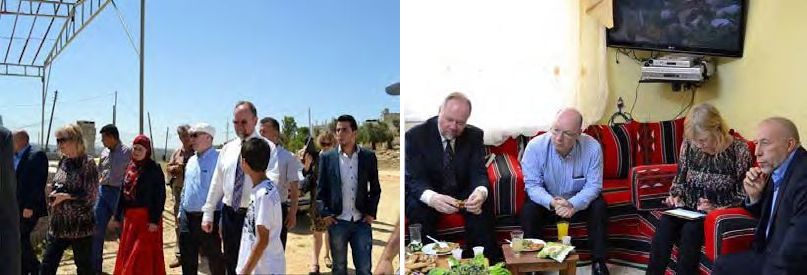
Left: The British consul-general, Sir Vincent Fean, and British minister Alistair Burt visit the village of Nabi Saleh. Right: Sir Vincent Fean and Alistair Burt meet with Naji al-Tamimi, the Nabi Saleh coordinator for the Popular Committees Against the Fence and Settlements (Facebook page of the British Consulate in Jerusalem, June 13, 2013)
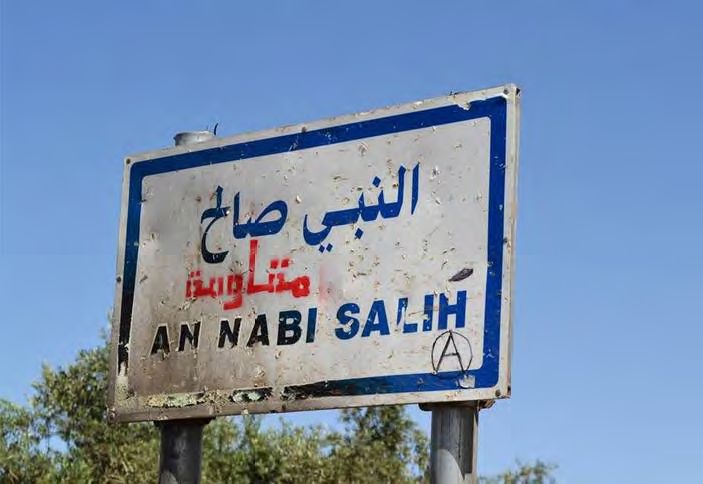
Sign at the entrance to the village of Nabi Saleh, a symbol of the popular resistance. The Arabic word in red (added to the sign by an anonymous hand) reads “resistance” (Facebook page of the British Consulate in Jerusalem, June 13, 2013)
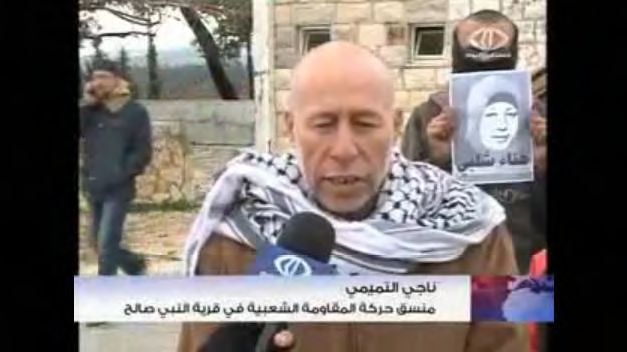
Naji al-Tamimi, popular resistance field activist, interviewed during a march in support of terrorist operative Hanaa Shalbi[4] (YouTube, March 3, 2013)
![]()
Notes:
[1] For further information about the Eighth Bil’in International Conference for Popular Resistance see the Terrorism Information Center, October 13, 2013 bulletin “PA-Sponsored Eighth International Conference for Popular Resistance Held in Bil’in to Discuss Broadening It and Increasing Its Effectiveness.”
[2] For the violent nature of the popular resistance see the May 20, 2013 in-depth study “The Palestinian Popular Resistance and its Built-In Violence.”
[3] During 2012 and 2013 Palestinian activists erected a series of outposts in Judea and Samaria to establish facts on the ground and challenge Israel. For further information see “The Palestinian Popular Resistance and its Built-In Violence,” Footnote 2.
[4] Hanaa Shalbi is a Palestinian Islamic Jihad terrorist operative, who spent two years in administrative detention and was released in the Gilad Shalit prisoner exchange deal. She was detained again in February 2012 when she returned to terrorist activities. She was deported to the Gaza Strip as part of a plea bargain with the military attorney’s office.



 RSS
RSS


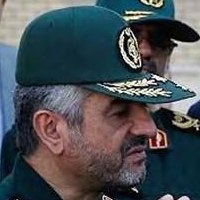

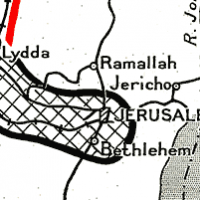












Latest Comments
Hello Mike, Thank you for your positive feedback to the article. I felt there wasn’t too much critical analysis of ...
Thanks for this considered and well constructed article. A follow up article on the manner in which the editorial contro...
THE CLUELESSNESS OF CLAIMING THAT OBAMA'S MIDDLE EAST POLICIES WERE A FAILURE CANNOT BE FURTHER FROM THE TRUTH, WHAT THE...
As long as Obama is the president of the usa do not trust the us government......
Thank you for an good read....